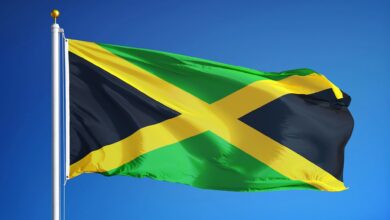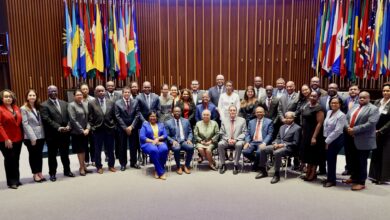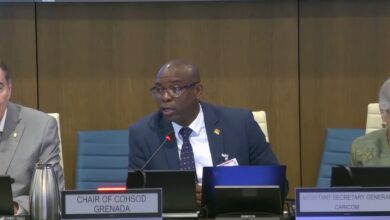(CARICOM Secretariat, Turkeyen, Greater Georgetown, Guyana) CARICOM and UNAIDS are hosting the Launch of the Report of the UNAIDS and Lancet Commission: Defeating AIDS- Advancing global health at The 36th Meeting of the Conference of Heads of Government of CARICOM on 3 July 2015 at the Hilton Hotel in Barbados.
 The Commission, which was established in 2013, brought together 38 Heads of State and political leaders, HIV and health experts, young people, activists, scientists, and private sector representatives to ensure that lessons learned in the AIDS response can be applied to transform how countries and partners approach health and development.
The Commission, which was established in 2013, brought together 38 Heads of State and political leaders, HIV and health experts, young people, activists, scientists, and private sector representatives to ensure that lessons learned in the AIDS response can be applied to transform how countries and partners approach health and development.
While unprecedented progress has been made to increase access to HIV treatment globally, the report shows that the rate of new HIV infections is not falling fast enough. This, combined with high demographic growth in some of the most affected countries, is increasing the number of people living with HIV who will need antiretroviral therapy to stay alive. Nonetheless, the report presents compelling evidence of how the end of the AIDS epidemic as a public health threat is feasible with evidence-informed and rights-based strategies. It presents seven recommendations to do so and makes the case that the determining factor will be global collective political will.
The report has particular relevance for the Caribbean where HIV infection rates remain high. An estimated 250,000 adults and children are living with HIV in the region. Cuba, the Dominican Republic, Haiti, Jamaica and Trinidad and Tobago account for 96% of all people living with HIV in the region with Haiti alone accounting for 55% of them. Challenges to the HIV response in the region include the lack of capacity of countries to finance their HIV responses, and high costs of HIV services. Punitive laws, stigma and discrimination, affecting key populations such as gay men and other men who have sex with men and sex workers, continue to drive the epidemic underground.
H.E Ban Ki-moon, UN Secretary General will launch the report and Prime Minister Portia Simpson Miller, a member of the Commission and Prime Minister Timothy Harris CARICOM Lead Head for Human resources, Health and HIV will be among those that will bring remarks.
The Caribbean launch provides an opportunity to highlight specific recommendations of the UNAIDS and Lancet Commission that are relevant to both national and regional responses required to end the AIDS epidemic in the Caribbean. This event takes place in the run up to the September UN General Assembly. As such, it can create further momentum to scale-up action and generate awareness among political leaders of the contributions of the AIDS response to broader global health outcomes, such as in the area of non-communicable diseases, as well as sustainable development, more broadly. It can also create awareness of how the AIDS response is supporting, and integral to, other related global initiatives such as reducing violence against women and children, access to affordable treatment and human rights and dignity for all
At the global launch of the report which took place in London on June 25 Michel Sidibe UNAIDS Executive Director put the issues into perspective “We have to act now. The next five years provide a fragile window of opportunity to fast-track the response and end the AIDS epidemic by 2030,” he said






